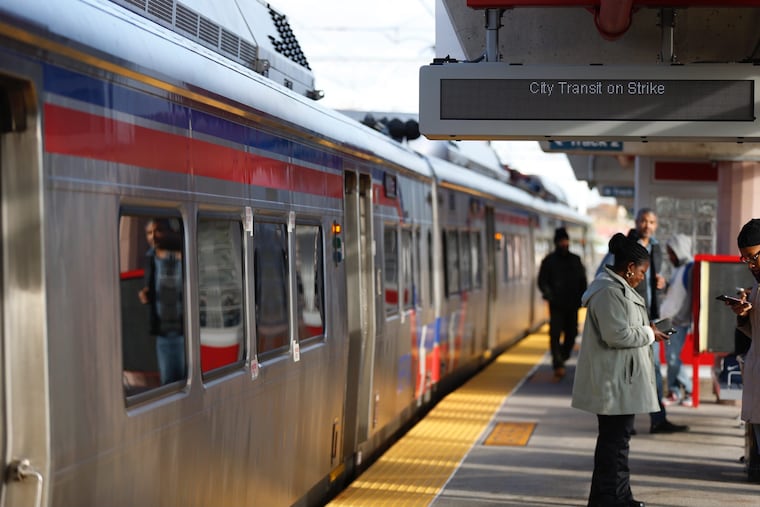Why SEPTA’s safety system didn’t stop a train collision at Temple University
Why were two trains able to bump into each other on SEPTA's network this week?

On Tuesday night, one SEPTA train bumped another at the Temple University station.
Both trains were in motion, and both carried passengers, but the impact was mild — one train was moving just 15 mph or slower, SEPTA estimated — and any injuries were so minor they were treated at the scene.
The incident is a reminder, though, that Positive Train Control, an automatic speed control and braking system that SEPTA has largely finished installing on its network, isn't a cure-all for any problem that might come up on the railroad.
The incident Tuesday happened when one Regional Rail train on the West Trenton Line had begun pulling away from the station as another pulled in. Both were heading toward Center City. The trains suffered no damage, officials said.
Nonetheless, the incident is under investigation, SEPTA reported.
America's railroads are barreling toward an end-of-2018 deadline in which every heavy passenger rail line in the country is supposed to have PTC installed. They're running late, though, and 12 railroads may miss the deadline and won't qualify for an extension that the Federal Railroad Administration could grant, FRA officials have said. SEPTA, by contrast, has been ahead of the game on PTC, with the system in place and operating on all but about 30 miles of track. The areas where it is not operational are tracks SEPTA shares with freight trains.
PTC can control speeds and enforce braking if a train is going too fast, as happened to catastrophic results in 2015 when an Amtrak train derailed on a section of track in Philadelphia where PTC had not yet been installed. The technology also identifies where trains are on the same track and ensures one doesn't get too close to another. PTC would have prevented that Philadelphia derailment that killed eight, officials have said, and would have likely stopped another derailment in Washington state in December 2017 that killed three.
>> READ MORE: Tragic parallels between Washington Amtrak derailment and Philly's are growing
Because trains need to operate in close proximity to one another and to maintenance vehicles in stations, SEPTA officials explained, PTC is programmed to essentially ignore any trains traveling slower than 18 mph. That's why PTC didn't stop the Regional Rail train that was traveling into Temple University station on Tuesday, officials said.
Something similar happened on the Norristown High-Speed Line in August 2017. A car on that line hit a stationary car at the 69th Street Transportation Center, injuring 32. The braking system on that line, Automatic Train Control, is less sophisticated than PTC, but would be able to slow a speeding train. Except that, as with Tuesday's incident on Regional Rail, the system won't restrict slow-moving trains.
>>READ MORE: Trains crashed at 69th Street despite safety protections
The incident wasn't alarming to Matt Mitchell, vice president of the Delaware Valley Association of Rail Passengers.
"I don't think there's a potential to be more serious," he said. "The reason even minor incidents like this get publicity is they're very, very rare."
It did highlight the need, though, for drivers to stay vigilant even on tracks where PTC is in effect. Slow-moving trains can stop abruptly or, at some SEPTA suburban stations, pedestrians may be crossing the tracks, and a train engineer can miss these sudden unexpected moments while not paying attention.
"I think there's concerns for training and situational awareness," Mitchell said.
SEPTA has training and safety programs for train engineers, said Jeff Knueppel, the transit agency's general manager.
PTC "is still a very, very significant improvement in safety," he said. "It really has been a huge leap forward in safety for us."